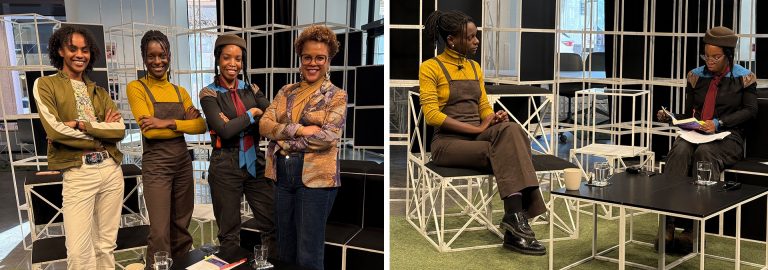Simone de Beauvoir Institute hosts Afrofeminist author Douce Dibondo

Concordia’s Simone de Beauvoir Institute (SdBI) marked Black History Month with a public seminar featuring author Douce Dibondo on February 26. The French-Congolese journalist, poet and podcaster recently published her latest book, La charge raciale : Vertige d’un silence écrasant (The Racial Burden: An Overwhelming Silence), exploring the weight of racial oppression on people of colour, particularly Black individuals, within a white supremacist society.
The conversation between Dibondo and interdisciplinary artist Po B. K. Lomami unfolded in French at 4TH SPACE. La Table Ronde du Mois de l’histoire des Noir.e.s co-presented the event.
Marlihan Lopez is the program and outreach coordinator for the SdBI. In 2019, she was a laureate for the Mois de l'histoire des Noir.e.s. She says she has developed invaluable connections with people at the Table Ronde in the years since.
“This year, the Table Ronde invited Douce Dibondo to Montreal. The director, Nadia Rousseau, reached out to me to see if the Simone de Beauvoir Institute would be interested in collaborating,” Lopez explains. “We immediately accepted, and the Black Perspectives Office agreed to provide additional financial support.”
‘There’s a form of silencing’
Dibondo defines la charge raciale as the burden Black people carry living within a white-majority society. She describes how they are forced to constantly develop adaptive strategies to protect themselves against micro- and macro-aggressions. Her book categorizes this concept into three domains. The first is historical, especially as it relates to the ongoing impacts and legacy of slavery. The second is interpersonal, in terms of how Black people relate to institutions like the police, but also family and romantic partnerships. And the third is what she calls the “intrapersonal” burden, which is often made invisible.
“It takes such enormous energy to convey every single moment of racism that we experience (looks, suspicions, whispers). At the end of the day, we can’t make a minute-by-minute summary of the Black experience. So, there’s a form of silencing and psycho-existential burden,” Dibondo explains.
Lomami, who is a Concordia alum and current MFA student in studio arts – intermedia, took a conversational and engaging approach to their task as moderator. They noted the importance of Dibondo’s book being a French text, given that much of the Black feminist scholarship canon comes from North Americans writing in English. “These don’t reflect the entirety of our experiences,” Lomami pointed out.
Following the on-stage interview between Dibondo and Lomami, audience members, attending both in person and online, were invited to participate in a Q&A.
‘The first of many collaborations’
For the SdBI, this discussion between two dynamic queer, Afrofeminist thinkers and artists was a natural fit with their event programming. In 2023, the institute launched the Dr. Esmeralda Thornhill Black Feminist Speaker Series, which happens annually in October.
Events like these align with Concordia’s commitment to supporting Black knowledges, also reflected by the new Minor in Black and African Diaspora Studies in the Canadian Context, launching in September 2025.
As for the SdBI’s work with the Table Ronde, Lopez says, “I hope this is the first of many collaborations with them and that we can continue offering programming on Black studies, Black queer feminisms and their intersections.”
Watch a recording of the conversation between Douce Dibondo and Po B. K. Lomami, hosted by the Simone de Beauvoir Institute and La Table Ronde du Mois de l’histoire des Noir.e.s. at 4TH SPACE, with the support of Concordia’s Black Perspectives Office.




